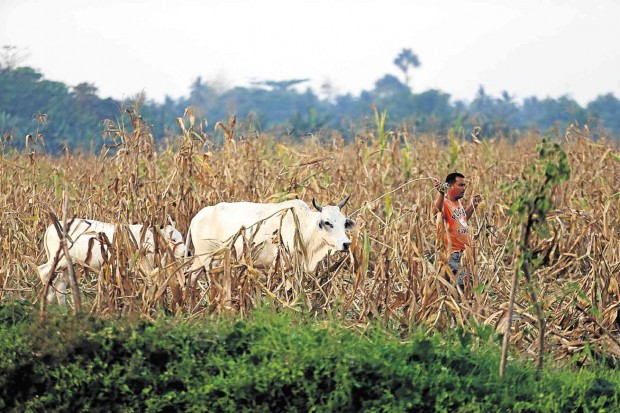ARMM loses P140M to drought, rats

THE CORNFIELD in Barangay Tukanalipao in Mamasapano, Maguindanao province, site of last year’s fighting between police commandos and Moro rebels, was not spared by rat infestation. JEOFFREY MAITEM / Inquirer Mindanao
COTABATO CITY—The prolonged dry spell has destroyed more than P140 million worth of crops in the Autonomous Region in Muslim Mindanao (ARMM), agriculture officials said on Monday.
Alexander Alonto, regional secretary of the Department of Agriculture and Fisheries (DAF-ARMM), said agriculture officials were expecting the amount to increase because his office has yet to receive full reports of damage from provincial agriculture officers.
Aside from the drought and shortage of water supply, farmers in the region are also facing another menace—rat infestation.
Alonto said the value of crops destroyed by the dry spell in the region reached P124 million while losses in farms hit by rat attacks were recorded at P16 million in Maguindanao province alone.
He said the DAF-ARMM is waiting for agriculture personnel in Lanao del Sur to finish their assessment and evaluation before the agency releases complete figures on the extent of devastation.
Article continues after this advertisementCiting data from agriculture officials, Alonto said Maguindanao was hardest hit because most of its agricultural products were on its vegetative stage.
Article continues after this advertisementDrought and rat infestation destroyed about P94 million in Maguindanao, affecting 21,000 farmers in 15 towns, he said.
Alonto said 11 of Maguindanao’s 36 towns have been hit by rodent attacks, destroying the livelihood of 12,000 farmers.
In Pigcawayan town in North Cotabato province, farmers have become helpless against rat attacks, saying they would wait for assistance from the government before they revive their farms.
Farmers in Kabacan town in North Cotabato have resorted to killing rodents to cushion the impact of infestation and to receive rice in exchange for rat tails submitted to the Kabacan government.
As an incentive, a farmer who turns over 500 rat tails gets 50 kilograms of rice.
But farmers in Pigcawayan said they do not resort to killing rats. “Our belief is the more you kill rats, the more it will get back at you. [It will destroy] your clothes, your valuables or [attack] your work animals, so we do not kill them,” said farmer Aliuden Ibrahim, whose family’s ready to harvest palay was destroyed by rats.
In Davao del Sur province, the Department of Agriculture (DA) has stopped cloud seeding operations due to the shortage of funds.
Nally Bangoy, head of the office of the provincial agriculturist (Opag), said the DA allocated only P4 million for a 45-minute a day cloud seeding operation from Jan. 26 to 31.
Farmers, however, are asking the DA to conduct more cloud seeding operations to save their crops.
Farmer Aquilina Mendoza, 84, said the DA can also provide them with water pumps so they can draw out groundwater to irrigate their farms.
Mendoza expects to lose 11 sacks of palay from her 1.5 hectare farm as the drought lingers.
The Opag said at least 27,124 ha of rice farms in Davao del Sur and Davao Occidental have been affected by the drought.